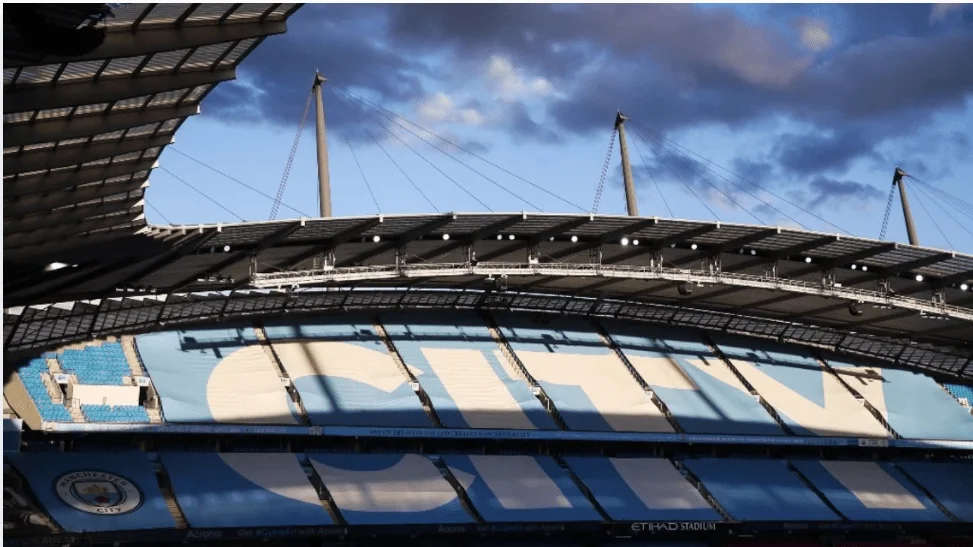Manchester City aims to make the Etihad Stadium more accessible to fans across the globe via metaverse.

Manchester City is making its way to the metaverse, and they won’t be alone there.
Overlapping advances in camera technology, fan engagement techniques, and blockchain use are encouraging teams to consider the potential of hosting more supporters in virtual digs than they could accommodate in their concrete and steel facilities.
Rather than striking arrangements with mayors or governors, teams are looking for ways to collaborate with both newcomers and internet behemoths. Online attendance may become a reality shortly.
Global television deals and social media platforms have aided the development of large fan bases for the world’s most popular franchises. According to a recent accounting, Manchester City had over 75 million social media followers. However, interacting on Instagram is the only way they can feel connected.
“We know that fandom is very much nurtured by fans meeting each other,” Manchester City Football Group CMO Nuria Tarré said. “Finding a platform in a virtual online world where fans can create these new communities is a primary objective.” Virtual worlds could also attract young fans who haven’t developed live event attendance habits.
When Sony’s Japan-based research and development team contacted Manchester City in the middle of last year, the club’s metaverse ideas began to take shape. Sony was looking to expand its sports applications while developing virtual reality for its PlayStation and Sony Entertainment platforms, and gave up a subsidiary, Hawk-Eye, to digitally map Etihad Stadium for virtual reconstruction. Hawk-player-tracking eyes and computer vision technology are expected to help bring gaming action to the virtual world in real-time.
Digital experimentation has also accelerated in the United States as a result of new camera improvements. The NBA’s Brooklyn Nets have placed 100 new Canon cameras in Brooklyn that capture plays in three dimensions, allowing TV producers to “position” cameras wherever on the court. In January, Nets parent company BSE Global CEO John Abbamondi told Sportivo, “We think it’s going to alter the way our fans experience the game of basketball.” The technology has now become the cornerstone of a developing “Metaverse” concept.
Manchester City’s Goal On Metaverse
Manchester City’s goal, according to Tarré, is to make the Etihad more accessible. “It’ll be a chance to invite people who have never been to the stadium to see what it looks like, as well as to explore portions of the stadium that are generally not seen.” “We’d love to explore how it feels to experience the game within that metaverse,” she stated one day. Real-world media rights restrictions are currently impeding progress. Reality tends to bite.
The club, on the other hand, could be able to develop innovative methods to highlight archival material within its control, putting nostalgia and emerging technology to the test. Virtual reality experiences are likely at some time, according to Tarré, but the goal is to make the virtual world available to followers all over the world via smartphone. Partner brands are also likely to find a home in the Etihad.
The Atlanta Braves of Major League Baseball will debut their own browser-based home, named Digital Trust Park, in April. The park will have exclusive content, meet-and-greets, fan engagement, and contests, and will be built using Epic Games’ Unreal Engine (which powers online worlds like Fortnite).
“We feel we’re launching a venue,” Braves SVP of marketing and content Adam Zimmerman stated recently.
Existing online worlds are increasingly courting sports properties as clubs begin to construct their own virtual experiences. Following a succession of tie-ups, team logos (including Manchester City’s) are already prominent among Fortnite avatars, but that’s just the beginning.
GreenPark Sports, which has established a virtual environment for fans of the NBA, La Liga, League of Legends, and, most recently, MLS, has partnered with entire leagues to buy into the need for a home in the metaverse. “Over the last year, there’s been a lot more of a lean-in,” GreenPark chief strategy officer Tony Grillo said.
While GreenPark built its digital world from the bottom up, incorporating sports elements into a new setting, Grillo believes it is more practical for teams to begin by duplicating their existing spaces online. “You don’t want to lose sight of the history of what you have,” he remarked. “However, you wouldn’t be doing the virtual opportunities justice unless you went a step further, right?”
Such prospects, according to Grillo, include things that “may not exist or couldn’t exist in real life, but can exist in a virtual environment.”
Horizons Venues, a Meta platform, has long hosted NBA games and, more recently, an Overtime Elite dunk competition. Virtually Human Studios’ ZED HQ is located in Decentraland, a virtual reality platform based on the Ethereum blockchain, and additional teams may soon join.
Decentraland’s head of movies and entertainment, Alejandro De Grazia, said, “We are in contact with various entrepreneurs who are in talks with clubs to put their offices in the metaverse.”
More teams and leagues, according to Grillo, will embrace blockchain technology as the backbone of virtual economies in their digital venues over time. “We feel like everything is heading in that direction.”
